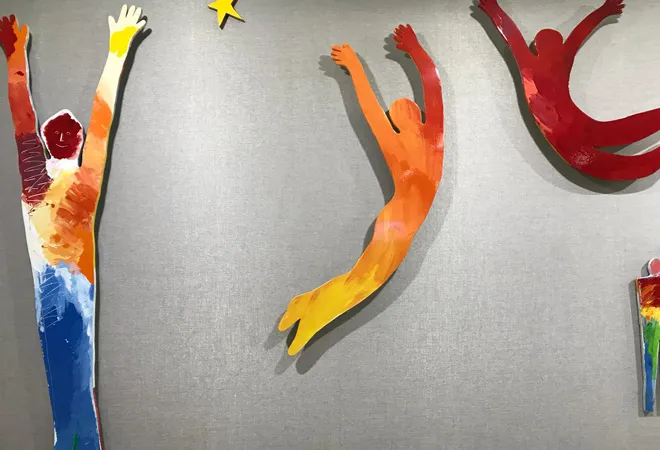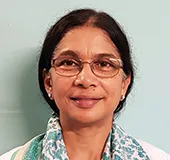-
CENTRES
Progammes & Centres
Location
It’s a challenge to address the social hierarchy of vocational education where, for example, in the medical profession, doctors enjoy a higher status and are revered whereas the nurses, radiologists and other supporting professionals remain at lower rungs of the ladder. How do we remove this bias and recognise the value of the supplementary healthcare set up without which doctors can’t function?

Image Source: Nikhila Natarajan
National Skills Network interviews ORF Senior Fellow Dr. Leena Chandran Wadia. Dr. Wadia sets the tone of the Skill Talk on the occasion of the upcoming consultative seminar ‘Skill India — The Way Forward in Higher Education.’
National Skills Network: Tell us about the initiatives from ORF in promoting vocational education in India.
Leena Chandran Wadia: At ORF, we have been engaged in research-based policy advocacy in school as well as higher education for almost a decade. About a year ago we realised that the picture would not be complete without understanding the challenges of vocational education. In most developed countries well over 50% of students in the age group 19-24 receive vocational education but in India this number is in single digits. So, this area became a priority and we have since been trying to understand the reasons why vocational education is languishing in India.
NSN: What is your opinion about the evolving skills ecosystem in India?
Wadia: We are particularly interested in how we can bridge the gap between mainstream education and vocational education by making the industry and academia come together. During the last decade many concepts and frameworks have been created such as the NSQF, QPs-NOS, RPL, etc., and bodies such as the NSDA, SSCs set up. These need to be understood by educational institutions so that they can also offer vocational education. TISS SVE has demonstrated a successful model and we are presently working on their case study.
The aim is to assess the strengths and weaknesses of the evolving skills ecosystem and the replicability of the various models, financial and otherwise, in which B.Voc is being offered. We hope to share a preliminary draft at the seminar.
NSN: What about the aspirational value of vocational education at the college level?
Wadia: It is time to conquer the biases and positively influence mindsets. The B.Voc experiments are still new and we are looking to learn from the experience of colleges that participate in the seminar, but vocational education will only become aspirational when it is well integrated into the mainstream and when students can find jobs, especially jobs that pay well. Since I have been engaged in policy research in education, I know how critical it is to focus on vocational education at the college level, having made initial interventions at the school level.
NSN: What are your expectations from the seminar as a key partner?
Wadia: We hope to make the seminar an annual event and continue the conversations with all the players in this space, so that we can collectively address the challenges of integrating vocational education. We have a special plenary session on the B.Voc programme at which we would like to assess the applicability of NSQF levels, QPs-NOS and other concepts to the different verticals. We have observed that B.Voc colleges prefer the services sector, perhaps because it is relatively low on investment. Colleges have chosen verticals such as hospitality, retail, software development, tourism etc., but they also need to match up their capacity with the requirements of the corresponding industries, by conducting skills gap analysis in their local environments.
Colleges have to gather data to understand the industry demand for various job roles in their regions. Only then will their graduates be able to find employment. The challenge for colleges is the mindset change they must acquire if they want to successfully offer vocational education.
NSN: Parental attitude and industry contribution are the two important factors that affect the success of any vocational programme. What is your view on this issue?
Wadia: The social bias exists both at the level of parents and educational institutions. It is all about providing the next generation with relevant education for the future. Even our mainstream higher education has not been able to prepare students to address social, economic and technological challenges, and scores low on employability. Parents are looking for social status but also an assurance of a well paying job.
Why should an excellent plumber or a mason be valued less than a software developer? We live in a society in which even teachers are not valued enough. In countries where vocational education has succeeded, these professionals are valued members of society and are paid very well. If industry comes forward to pay better for trained specialists, the situation may change. We need a coordinated set of changes and not isolated ones.
The NSQF provides a platform for industry to collaborate with academia. They can provide practical hands-on training that can be supplemented by academia with training in soft skills, digital and financial literacy, entrepreneurship etc. at the specified NSQF levels. Industry will need to be given incentives to come forward and give large numbers of students opportunities for on-the-job training, apprenticeships and so on.
NSN: Tell us about the post-event follow up plans.
Wadia: As a think tank, we will cull out all the policy recommendations from the seminar and take them to the government for action. We are already engaged with the Government of Maharashtra. They are committed to setting up several skills universities and are very keen to learn about the issues that they need to be careful about. Skills Universities ought not to be set up in the same mould as mainstream universities. New models will need to be found. Given the complementarity of the stakeholders that have come together to organize the seminar, I see an ecosystem emerging for making a difference in the long term.
This interview originally appeared on National Skills Network.
The views expressed above belong to the author(s). ORF research and analyses now available on Telegram! Click here to access our curated content — blogs, longforms and interviews.

Leena Chandran Wadia was Senior Fellow at ORFs Mumbai Centre. She has been leading the Mumbai Centres research and policy advocacy in education since 2010.
Read More +